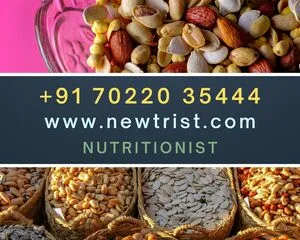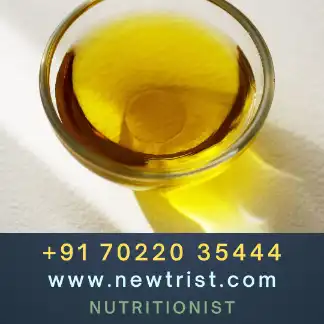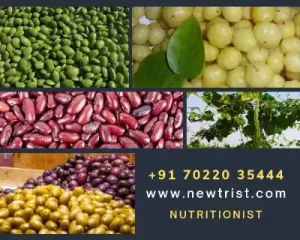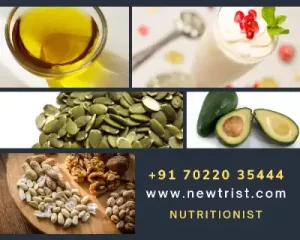The ultimate weight loss diet for PCOS insulin resistance includes more fibrous and protein sources and restricts simple carbohydrates, sugars, unhealthy fats, and fried foods.
- Early morning drink @ 6:30 am: Amla juice with 4-5 soaked walnuts
- Breakfast @ 9 am: Vegetable oats upma with 2 boiled egg whites
- Mid-morning meal @ 11 am: A cup of peeled pomegranate
- Lunch @ 1 pm: Brown rice with methi dal, carrot sabzi, and cucumber salad
- Evening snack @ 4 pm: A cup of boiled channa
- Dinner @ 7 pm: Mixed vegetable soup with tossed vegetables
Best Nutritionist in Bangalore
Consult 19-year-experienced Chief Nutritionist Vasanthi, in person at HSR, Koramangala, Bellandur, Haralur, Electronic city, or online across India.

- Maintaining a healthy weight can combat PCOS symptoms and insulin resistance. Consult our expert nutritionists for a meal plan to improve your insulin resistance.
- Rely on a diet rich in whole grains and unprocessed foods with a low GI.
- Reduce the intake of highly processed foods that are generally high in sugars, salt, and saturated fats which are the biggest enemy of weight loss.
- Choose lean sources of protein like skinless chicken, turkey, fish, nuts, and seeds for a fulfilling meal.
- Portion your plate size with more proteins, vegetables, healthy fats, and very few carbs.
PCOS is a major problem faced by many women during the reproductive stages. PCOS symptoms can be reduced to a greater extent to improve the chances of pregnancy.
Table of Contents
Limit carbohydrates to lose weight with PCOS and Insulin resistance
- Carbohydrate consumption can harm insulin levels and PCOS symptoms.
- Insulin resistance occurs when the cells fail to recognize the effects of insulin hormones on glucose levels. Almost 70% of women suffer from insulin resistance with PCOS.
- Insulin is a crucial hormone produced by the pancreas to regulate blood glucose levels and store energy.
- Elevated levels of insulin are linked to an increase in body fat and weight gain in both healthy and PCOS women.
- Foods with low-glycemic indexes can manage insulin levels as it does not cause a sudden rise in blood sugar levels. Insulin resistance is better with the consumption of low-GI foods.
Increased fiber intake for weight loss with PCOS and Insulin resistance
- Intake of foods high in soluble fiber keeps you satiated after the meal and aids in weight loss and improved insulin resistance.
- The average daily intake of fiber should be around 25 gm for women which helps in reducing total body fat and belly fat.
- Include plenty of fruits, vegetables, leafy greens, whole grains, millet, pulses, beans, legumes, nuts, and seeds for effective weight loss and the betterment of health.

Increase protein intake for weight loss with PCOS and Insulin resistance
- A protein-rich meal promotes a feeling of fullness and helps in the stabilization of blood sugar levels.
- Consumption of protein-rich foods promotes weight loss by lowering cravings, increasing energy expenditure, and controlling hunger hormones.
- Choose healthy snacks that are high in protein and eggs, nuts, legumes, poultry, sea foods, and whole grains for a protein-rich source.
Weight loss diet for PCOS insulin resistance includes healthy fats
- Including healthy fats in the meal can help in weight loss and manage your PCOS symptoms. Healthy fats make you feel more satiated than other foods.
- A diet rich in healthy fats resulted in effective weight loss and belly fat reduction.
- Adding healthy fats can increase stomach volume and curb hunger even though they are high in calories. This might reduce your calorie consumption as a result.
- Olive oil, avocados, nut butter, and seafood are some examples of healthy fats.
- The filling effects of meals and snacks can be further increased by combining healthy fats with a protein source.

Fermented Foods for Effective Weight Loss with PCOS and Insulin Resistance
- Weight maintenance and metabolism solely depend on healthy gut bacteria. There may be a reduction in the beneficial gut microbiome in women with PCOS conditions.
- Recent research hints that some probiotic strains can help women with PCOS shed kilos.
- Consumption of probiotic foods like yogurt, sauerkraut, kefir, and other fermented foods increases the number of good bacteria in the gut.
Mindful Eating for Weight Loss with PCOS and Insulin Resistance
- Diets frequently tried by PCOS women are three times more likely to experience eating disorders.
- Mindful eating habits make your body feel hungry and full, so you stop eating once you are full.
- Binge eating and eating while you are stressed are some of the eating behaviors which may be addressed with the aid of mindfulness-based approaches to food.
- Some research suggests a direct correlation between mindful eating habits and weight loss.
Reducing Sugar and Processed Foods for Weight Loss with PCOS and Insulin Resistance
- Limiting the intake of sugary foods and processed foods can aid in weight loss with PCOS.
- Sugary foods boost your blood glucose levels and increase the risk of obesity, and insulin resistance.
- The metabolization of sugars may be different for women with PCOS and those without it.
- Women with higher insulin sensitivity report higher levels of blood sugar than women without the illness.
- Natural and minimally/unprocessed foods help in a slow and steady rise in blood sugar levels.
- Nutritionists advise women with PCOS to cut down refined carbs and added sugars to manage their PCOS symptoms and keep a healthy body weight.
- Cakes, cookies, candies, pastries, baked goods, and fast foods are examples of foods high in refined carbs and added sugars.
Mediterranean Diet for Weight Loss and Inflammation Reduction with PCOS and Insulin Resistance
- When there is an injury/infection, your body naturally produces an inflammation reaction.
- Obesity is directly linked to chronic inflammation which is prevalent in women with PCOS. An increase in inflammation is observed with increased consumption of sugary and processed foods.
- Mediterranean diet rich in fruits, vegetables, whole grains, legumes, nuts, seeds, herbs, olive oil, and fatty fishes like salmons and mackerels are effective in fighting against inflammation.
- Blood markers for inflammation were shown to be higher in PCOS patients than in controls after taking a single dose of 75 grams of glucose.

The Role of Whole, Unprocessed Foods in Effective Weight Loss with PCOS and Insulin Resistance
- Disturbances in the metabolic process can result in extreme restriction of calories. You may end up eating more for the next meal if you are on starvation.
- The overall calorie expenditure may reduce with calorie restriction and increase the risk of weight gain in the future.
- A negative impact on hunger hormones can be noticed with the consumption of fewer calories.
- Opt for a diet rich in whole, unprocessed foods to aid in weight loss instead of starvation.
Gluten-Free Diet for Weight Loss in PCOS Insulin Resistance
- Following a gluten-free diet can help in reducing inflammation and PCOS symptoms.
- The gluten-free diet can help you to switch to healthier eating habits like whole foods that contain a low GI.
- Cutting carbohydrates to roughly 40% of a woman’s diet can help manage PCOS.
- Substitute complex carbohydrates for refined ones.
- Bread, processed cereals, cakes, cookies, pasta, noodles, bulgur wheat, and wafers are some of the foods that are rich in gluten to be avoided for weight loss in PCOS Insulin resistance.
- Antioxidant-rich foods and anti-inflammatory foods like fruits, vegetables, legumes, and other fiber-rich foods are the best alternatives for a gluten-free diet to avoid the consequences of health issues.
Maximizing Weight Loss with a Dairy-Free PCOS Insulin Resistance Diet
- Low-dairy diet aid in weight loss enhances body composition and lowers testosterone levels. It is believed that the impact occurs by lowering insulin secretion.
- Cottage cheese and curd are fantastic sources of protein which many women do not include in their diet.
- Low-fat dairy and starchy vegetables can have a positive impact on PCOS symptoms.
- Avoiding dairy products like milk, yogurt, cheese, cream, and paneer can be beneficial during the PCOS insulin resistance diet.
- Avail good quality proteins from legumes, pulses, and animal foods like eggs, chicken, turkey, and fish.
- Rely on calcium-rich foods like greens, almonds, seeds, figs, and fishes.

FAQs
Are healthy fats good for PCOS?
Healthy fats are extremely good for women with PCOS. Healthy fats like monounsaturated fats, and polyunsaturated fats are widely available in nuts, nut butter, seeds, avocados, olive oil, and fish. Add one or two teaspoons of roasted chia seeds or flax seeds to your oatmeal, fruit bowl, and smoothies for a crunchy texture and to reap the benefits of healthy fats.
Can a Mediterranean diet help with PCOS?
A Mediterranean diet is free from saturated fats, processed foods, and refined sugars, and serves to be an effective way to reduce chronic inflammation. The Mediterranean diet helps to control blood sugar levels, and it consists of foods rich in healthy fats that lower inflammation. Moreover, the Mediterranean diet improves ovulation in women with PCOS. The Mediterranean diet improves hormonal balance to have a healthy pregnancy.
Does gluten-free help insulin resistance PCOS?
A gluten-free diet provides numerous benefits for insulin resistance PCOS. It helps to lower inflammation and switch to healthier eating habits and avoid high glycemic index foods and processed foods that are rich in gluten. A gluten-free diet assists in weight management and improvement in the symptoms of PCOS. Eliminate baked goods and processed foods that contain good amounts of gluten.
Does the Mediterranean diet reduce insulin resistance?
The Mediterranean diet has a positive impact on insulin resistance in obese women. The Mediterranean diet focuses mainly on healthy plant-based foods which comprise fiber, proteins, vitamins, and minerals, and a rare appearance of sweets and sugar-based foods. the Mediterranean diet consists of foods that are minimally or unprocessed foods that reduce insulin resistance. The Mediterranean diet strictly prohibits the intake of red meat and processed meats.
How many grams of sugar can I eat a day with PCOS?
Women with PCOS should carefully monitor their sugar intake which does not exceed 45 gm (6 tsp) per day. Sugary foods and sweetened beverages promote inflammation and make insulin resistance worse. Making necessary changes in food habits safeguards you from unwanted sugar cravings. Consume adequate protein and healthy fats in your meal to curb your intake of empty calories. Eat small frequent meals to maintain your blood sugar levels.
How much protein should I eat a day with PCOS?
1.2 – 1.5 gm of protein per kg of body weight is recommended for women with PCOS. Protein-rich sources like legumes, chickpeas, kidney beans, broad beans, green peas, sweet potatoes, peanuts, almonds, eggs, deskinned chicken, and fish form part of your fulfilling meal. Protein keeps you full, balances your blood sugar, and slows down digestion. Protein foods support your physical workout and help you to stay energized.
How to lose weight with PCOS and insulin resistance?
Practicing healthy eating habits like reduced intake of refined carbs, plenty of fiber, adequate protein, more healthy fats, probiotic and fermented foods, and physical activities like brisk walking, jogging, cycling, swimming, aerobic exercises, and strength training help to lose weight with PCOS and insulin resistance. Cutting down on excess sugars, processed foods, and refined foods reduce inflammation and promotes weight loss.
Is a dairy-free diet good for PCOS?
Dairy products are good sources of saturated fats that aggravate the symptoms of PCOS. Lactose-intolerant patients may face difficulties in digesting dairy products. Unhealthy fats increase estrogen production which worsens the PCOS symptoms. Exemptions are curd and buttermilk which is rich in probiotics. It is not necessary to limit dairy completely and it can be consumed fat-free in limited quantities.
Is a high-protein diet good for PCOS weight loss?
Yes, a high-protein diet keeps you satiated for long hours, boosts metabolism, controls appetite, improves control of blood sugar levels, and reduced the cravings for sugary foods. Proteins obtained from animal foods are considered complete proteins as it contains all the essential amino acids needed by the body. Refrain from frying eggs, chicken, fish, and other protein-rich sources to stay away from the ill effects of saturated fats.
Is fermented food good for PCOS?
Fermented foods like probiotic curd, idly, dosa, and dhokla, and fermented drinks like kimchi, kombucha, sauerkraut, and tempeh are excellent sources of micronutrients like calcium, zinc, chromium, and selenium. Fermented foods improve metabolism and help in effective weight management. Fermented foods and probiotics help in managing a healthy gut and aid in weight loss.
Is gluten-free better for insulin resistance?
A gluten-free diet reduces inflammation and insulin resistance in PCOS conditions. Fried foods, junk foods, processed foods, sugary foods, and baked products that are high in gluten increase blood sugar levels. Gluten is a common intolerant which can deteriorate gut health and cause discomforts like bloating, nausea, indigestion, and stomach pain.
Is a high-fiber diet good for PCOS?
A high-fiber diet fights against insulin resistance and favors weight loss. High-fiber diet slows down digestion and reduces the effects of sugar on the blood. Fiber helps you feel full and helps to lower cholesterol levels. Include more vegetables, fruits, whole grains, legumes, nuts, and seeds for a good source of fiber in the diet. an average of 28-36 gm of soluble and insoluble fiber is essential for women with PCOS.
Is low-carb good for PCOS weight loss?
A low-carb diet improves insulin resistance and glucose intolerance. A low-carb diet is very essential for effective weight loss and eases anxiety and depression. A low-carb diet increases the chances of pregnancy and reduces complications during pregnancy. A low-carb diet is free from unhealthy fats found in processed and packaged foods which can make weight loss a nightmare. A low-carb diet also prevents the risk of cardiovascular diseases, hypertension, and diabetes.
Should I cut out sugars if I have PCOS?
Sugars are the main enemies of PCOS. Sugars add to weight gain and worsen inflammation and insulin resistance. Avoid sugary foods like cakes, cookies, candies, desserts, waffles, sweetened fruit juices, carbonated beverages, and pastries. Ensure your meal is composed of protein-rich and fiber-rich foods to satiate your appetite. Switch to organic jaggery, palm sugar, and honey for sweetness. Consuming whole fruits can satisfy your sugar cravings.
Should you limit carbs with PCOS?
Limiting simple carbohydrates is advised for patients with PCOS. Simple carbohydrates are present in refined grains, cereals, white rice, pasta, noodles, white bread, sweets, and baked goods. These foods get quickly absorbed into the bloodstream and cause a drastic rise in blood sugar levels. To manage this condition, the body needs to produce more insulin which can lead to multiple problems in women with PCOS.
What fermented foods are best for PCOS?
Fermented foods like kimchi, kombucha, kefir, sauerkraut, miso, tempeh, millet idly, multigrain fermented dosa, dhokla, and probiotic curd are best for PCOS. Fermented foods increase the gut microbiome flora and promote mineral absorption and fight inflammation. The gut produces serotonin which provides numerous benefits for PCOS conditions.
What foods have healthy fats for PCOS?
Healthy fats are widely found in nuts, seeds, avocados, olive oil, and fatty fish like salmon, sardines, and mackerel. Adding roasted chia seeds and flax seeds to your oatmeal gives your breakfast a crunchy texture. Throw some flax seeds and sunflower seeds over your fruit salad and enjoy. Healthy fats fill in your stomach and reduce your appetite making you consume fewer calories the entire day.
Why Protein is important in a PCOS Diet?
Proteins promote better digestion, boost metabolism, and play a vital role in the production of estrogen, testosterone, and insulin. Combining protein-rich sources with healthy fats makes you satiate faster and reduce the intake of refined foods and snacks. Proteins are broken down and digested slowly in the intestines so that their impact on blood sugar levels is at a steady pace.